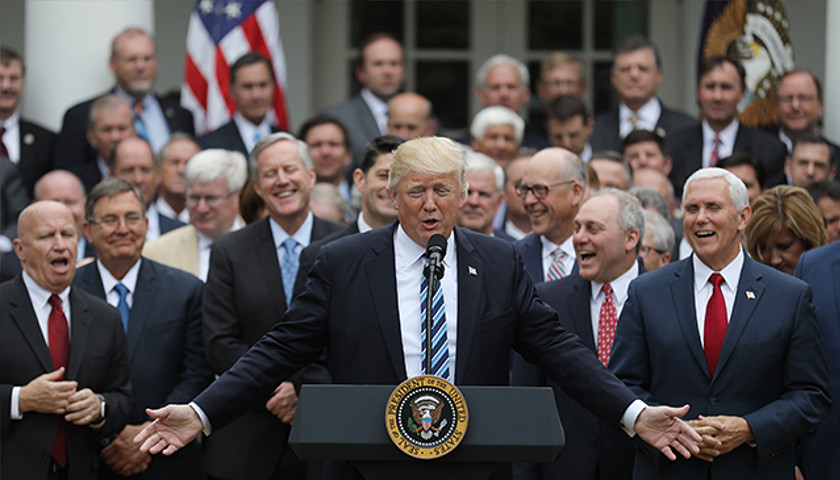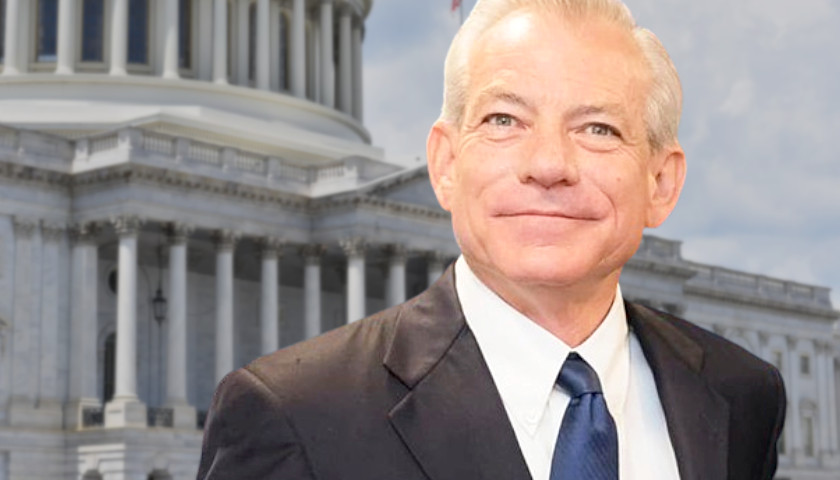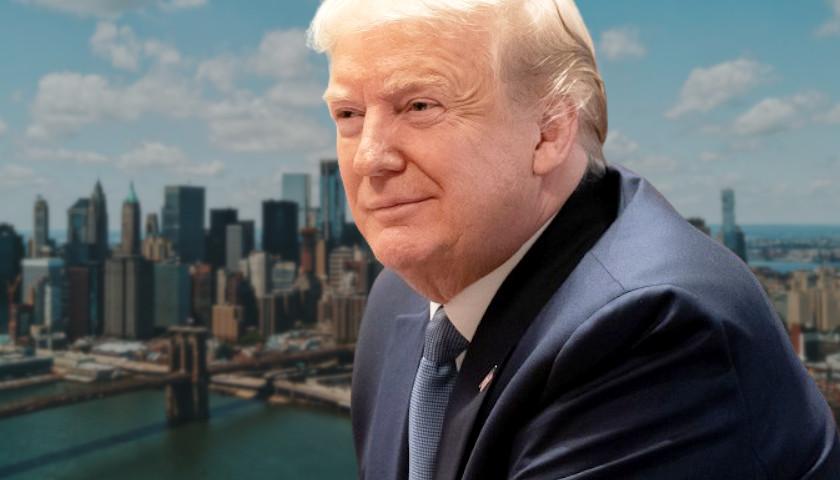by Jeffrey A. Rendall
Now that 2017’s few elections and reflections on the one-year anniversary of President Donald Trump’s triumphant win in the 2016 election are in the rearview mirror it’s time to look ahead to the all-important midterm elections of 2018. Midterms are always a big deal because they portend to reveal how well – or how poorly – a president is received by a wide cross-section of the American public.
Ahead of next year’s vote media pundits are doing what media pundits always do, namely find any way feasible to describe the Republican Party as being in trouble. Their routines are predictable: wake up in the morning, put on a pot of coffee, take their anti-depressant medication, check Trump’s twitter feed, organize their angry thoughts and then scribble a story bashing Trump and predicting doom.
In Trump’s case it’s been happening for well over two years now so liberal journalists have the shtick down cold. The only problem is their predictions rarely come true.
Other commentators actually look at the facts and try to draw some reasoned conclusions. David M. Drucker and W. James Antle III of the Washington Examiner wrote earlier this week, “One year out from the midterm congressional elections, it is hard to imagine things looking much better for the Democrats on paper. Voters tell pollsters they prefer Democratic congressional candidates to Republicans — the so-called ‘generic ballot’ — by an average of 10 points. In one October survey by CNN, the margin was 16.
“On Nov. 6, 2018, a third of the Senate and all 435 seats in the House will be up for election. In seeking to erase the Republicans’ 24-vote House majority, Democrats get to start with 23 GOP-held districts that went for Hillary Clinton in 2016. But some party operatives believe they have viable candidates in as many as 80 districts, allowing them to play offense all over the country.
“’Viable’ may be in the eye of the beholder, but Democratic candidates are plentiful even in some marginally competitive congressional districts and, in many cases, they are flush with cash. One Democratic operative said that 35 of the party’s challengers outraised Republican incumbents in the last quarter while only two Republican challengers outraised Democratic incumbents.”
As was demonstrated by this year’s special elections Democrats have more than enough money thanks to outside forces seeking to prove Trump is a disastrous failure, but the grassroots is no longer unaware and people were motivated enough to retain all the seats for the GOP.
Tuesday’s elections actually showed the opposite – the losses the party sustained in Virginia in particular could indicate there is a growing case of Trump fatigue.
No disrespect to the Examiner reporters but theirs is the same arguments we’ve heard time and again about the Democrats. In 2016 the media was brimming with optimism because the Republicans appeared to have no clear leader (and a presidential field of 17 candidates) while the Democrats offered a predetermined frontrunner with universal name recognition, unquestioned fundraising capability and backed up by an occupier of the White House who they claimed was such a great and popular guy that people would rush to elect more Democrats just because he puts on pants every morning.
Drucker’s and Antle’s article is long and thorough in its presentation of the dilemmas faced by both parties ahead of what promises to be a drawn-out political bloodbath over the direction of the country. And while it’s impossible to precisely predict what the conditions will be a year from now there are certain trends that provide good clues well in advance.
Despite the obsessive concentration of news reporting it doesn’t really have anything to do with fundraising totals or current poll numbers. President Trump’s approval rating hasn’t fluctuated a whole lot since January 20 when he took the oath of office, though they’re currently about as low as they’ve ever been. The recent revelations of Clinton and Democrat Party involvement in the infamous Trump dossier could conceivably sway the numbers upwards a bit but it’s more likely people have stopped listening to what the Democrats do and just focus solely on whatever Trump is up to at the moment.
Not even after the August incident in Charlottesville (where Trump said “both sides” were to blame and there were “good people” in both camps) did the president’s ratings change all that much. It’s hard to conclude that this trend will change.
So therefore it’s safe to surmise next year’s elections may not be about Trump the human being. That subject has been hashed out in public for the past two-plus years. Trump could be shown deworming puppies in an animal shelter for a month straight and the white-hot angry liberal left would still claim he’s abusing canines for his own enrichment.
And the media would be right along with the Trump-haters. Crooked Hillary may be enduring a lot of negative press in present circumstances but Democrat memories aren’t long and sooner rather than later she and Bill will be back in the liberals’ good graces and people like Donna Brazile will be left crawling in the unemployment line dragging a stack of books no one wanted to buy.
I think a better measure of how well the Republicans will do next November is the degree to which the party pulls together to enact the Trump agenda. There were the many and varied failed attempts to pass an Obamacare repeal earlier this year and tax reform promises to eat up a lot of the party’s remaining political capital, but if GOP leaders can piece together enough support to get some things accomplished then it seems voters will be open to choosing Republicans again when the time comes.
The back-and-forth over Trump and the top congressional struggles may earn the most headlines but behind the scenes Republicans are having successes in less attention-attracting matters such as pushing through some of Trump’s most important nominees.
Ryan Lovelace of the Washington Examiner reported, “Republicans controlling Congress in the Trump era are moving at a much faster clip than Democrats ever did during Obama’s tenure. Four federal appeals court nominees were confirmed by the first anniversary of Obama’s inauguration, while Trump already has placed eight judges on the appeals courts, according to data compiled by the Federal Judicial Center…
“Trump’s shaping of the federal courts is being made possible by Republicans in the Senate and White House, who are working together in an unprecedented fashion to confirm conservative judges.
“Unlike Justice Neil Gorsuch’s confirmation to the Supreme Court, which required killing the Senate filibuster for high court nominees, Senate Republicans’ newest accomplishment in loading up the federal judiciary with Trump judges came without changing Senate rules or traditions. The groundwork began with Senate Judiciary Committee Chairman Chuck Grassley’s work behind the scenes to overcome Democrats’ opposition so that he didn’t have to make changes to the Senate’s blue slip procedure.”
Ever a man of action, Grassley personally visited Democrat senators from the states where Trump’s nominees originated from in order to expedite the process of confirmation without completely altering the “blue slip” tradition (where home state senators may withhold their approval by simply not returning a piece of paper).
Only idiot Minnesota Senator Al Franken refused to cooperate with Grassley. What do you expect?
As a result of Grassley’s goodwill gestures the Democrats largely withdrew from their procedural stalling tactics and the slate of judges received up-or-down votes. They all passed; the process actually worked. But will the good news reach the masses? Would they care?
More likely the GOP’s ability to put together and pass tax reform/tax cuts will carry much greater weight with the grassroots. Confirming judges is great but it’s hard for the average person to see how such things improve their daily lives – it’s not like receiving a tax cut or solving the mess created by Obamacare.
The Russian collusion issue has all-but died out despite the indictments of a few former Trump campaign associates. Nobody’s paying attention to it anymore. And even if special prosecutor Robert Mueller should come up with something more it won’t be taken seriously because James Comey and Mueller – and all of the intelligence community for that matter – have been discredited by the Uranium One scandal.
Congressional investigations will get much further in finding the real truth. We’ll all have to wait to see what happens.
Regardless, the parties will press on with the establishment trying to choose their own candidates for 2018. Kevin D. Williamson of National Review wrote, “The project to make the Democratic party an instrument of the Clinton campaign in order to prevent Bernie Sanders from making it an instrument of his own ambitions was dishonest, corrupt, and possibly illegal.
“It was also exactly what political parties are supposed to do. A little democracy, like a little whiskey, is a good thing — too much and you end up with Ted Kennedy.
“If the Republicans had any sense, they’d be looking to enact reforms that allow them to do legally and openly what the Democrats did shame-facedly and left-handedly. But Donald Trump was right about one thing: Winning is the great narcotic. Give them that, and they’ll be content. If Herself had won in 2016, we would not be hearing a peep about any of this, least of all from Donna Brazile, who would be enjoying some comfortable White House sinecure instead of hawking books. Republicans won in 2016.”
As I usually do, I disagree with Williamson. The Republican establishment isn’t passively accepting winning as a reason to lay off the democratic process that brought Donald Trump victory in 2016. Through groups like Mitch McConnell’s Senate Leadership Fund they’re delving ever deeper into primaries and trying to discourage grassroots-favored candidates from running against the ruling class’s hand-picked go-along-to-get-along types.
It happened in Alabama in September and will reoccur whenever conservatives get too close to bumping them off. Conservatives have a long way to go before the 2018 elections and the biggest (and most important) battles will take place in the party primaries, not against Democrat opponents.
Party elites should not choose the candidates; this decision needs to be made at the local level, not at party headquarters in Washington.
To sum up, there isn’t much use in trying to forecast what will happen in next year’s midterm elections so far in advance. Too much could happen – or not happen – in Congress to make an educated guess as to how strongly voters will desire to bolster Republican majorities. For now, conservatives should focus on the things that can be controlled: nominating good candidates in the primaries and pressing to pass President Trump’s winning agenda.
Reprinted with permission from ConservativeHQ.com.









I would say that the Republicans have already blown the 2018 elections. As in years past, they have done nothing but continue to whine about the Democrats. For seven years, “We are going to repeal and replace Obamacare”. They were only bluffing as they had no idea the American people would actually believe them and give Republicans the Congressional majority along with the White House. As proof of this, the Republicans had no new healthcare nor tax plan even on the drawing board when they took office. This comes under the guise of political fraud.